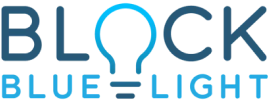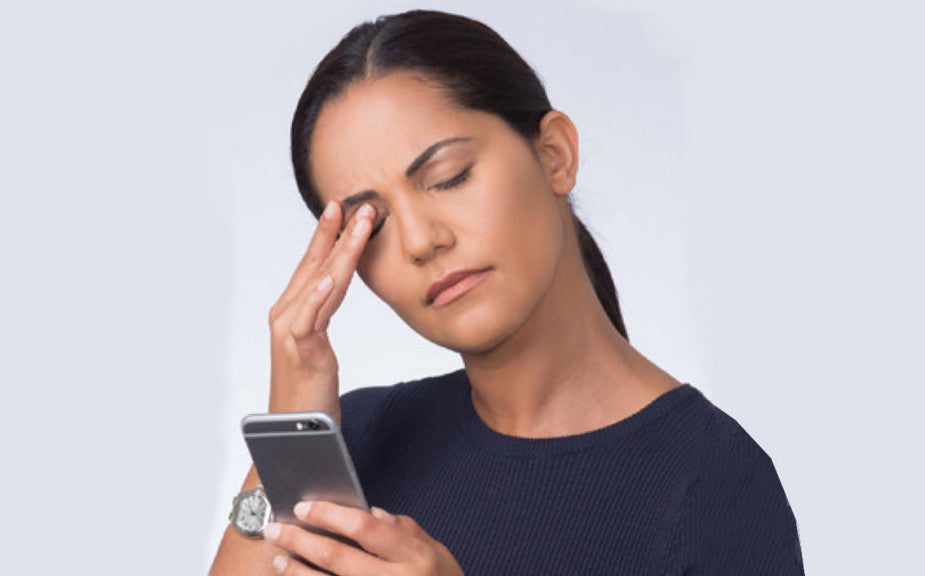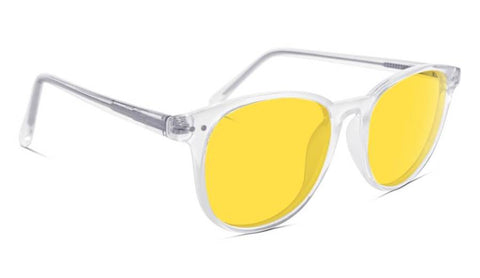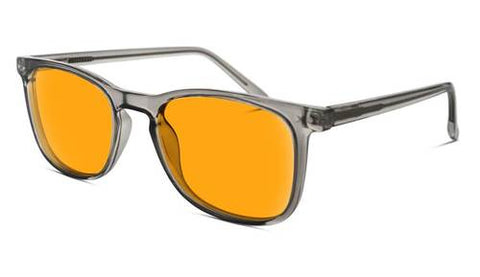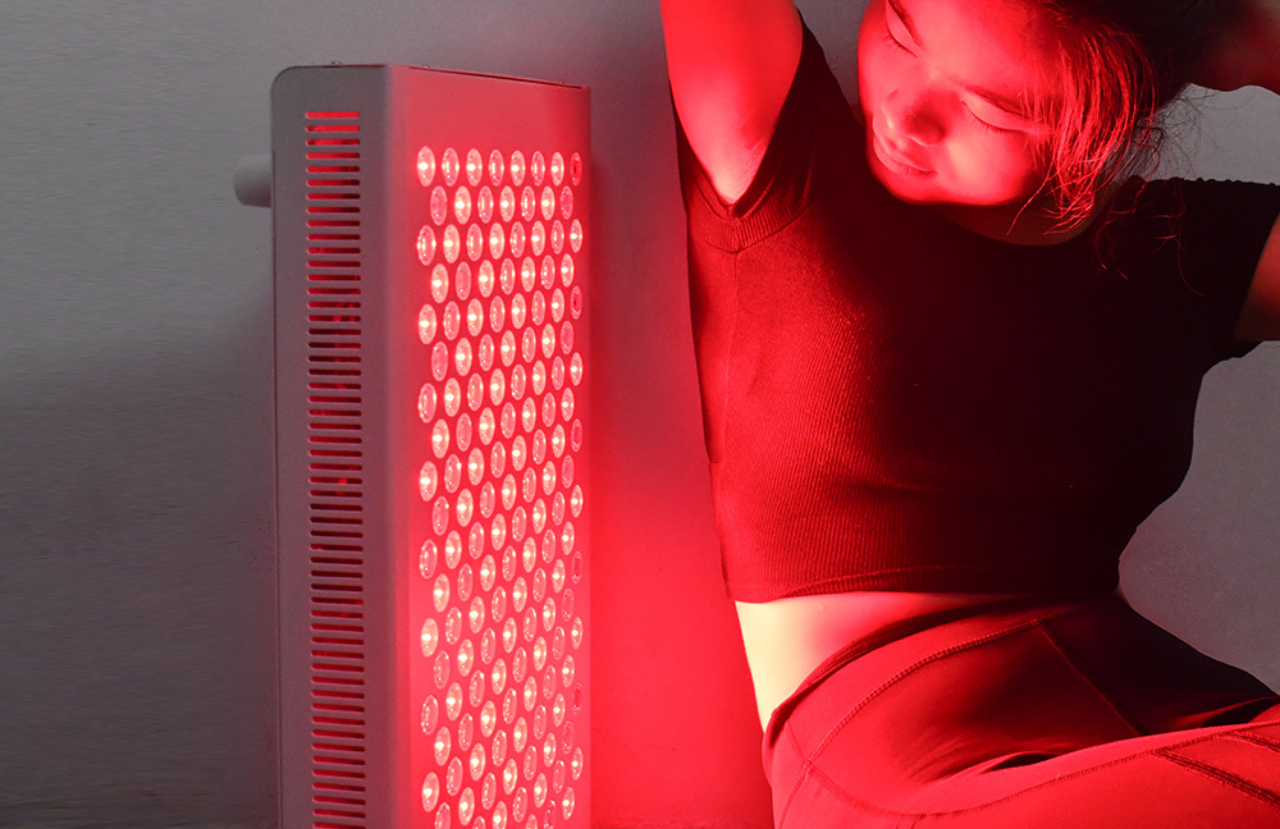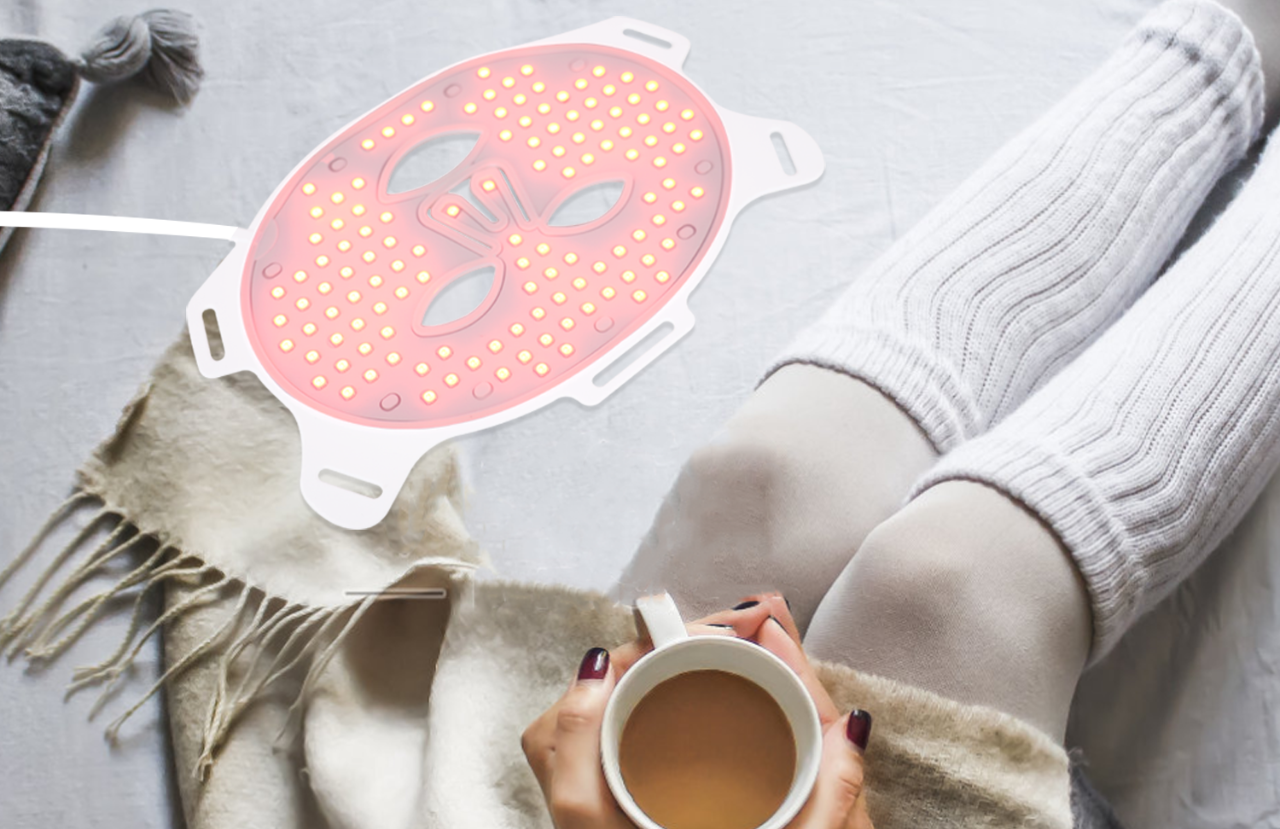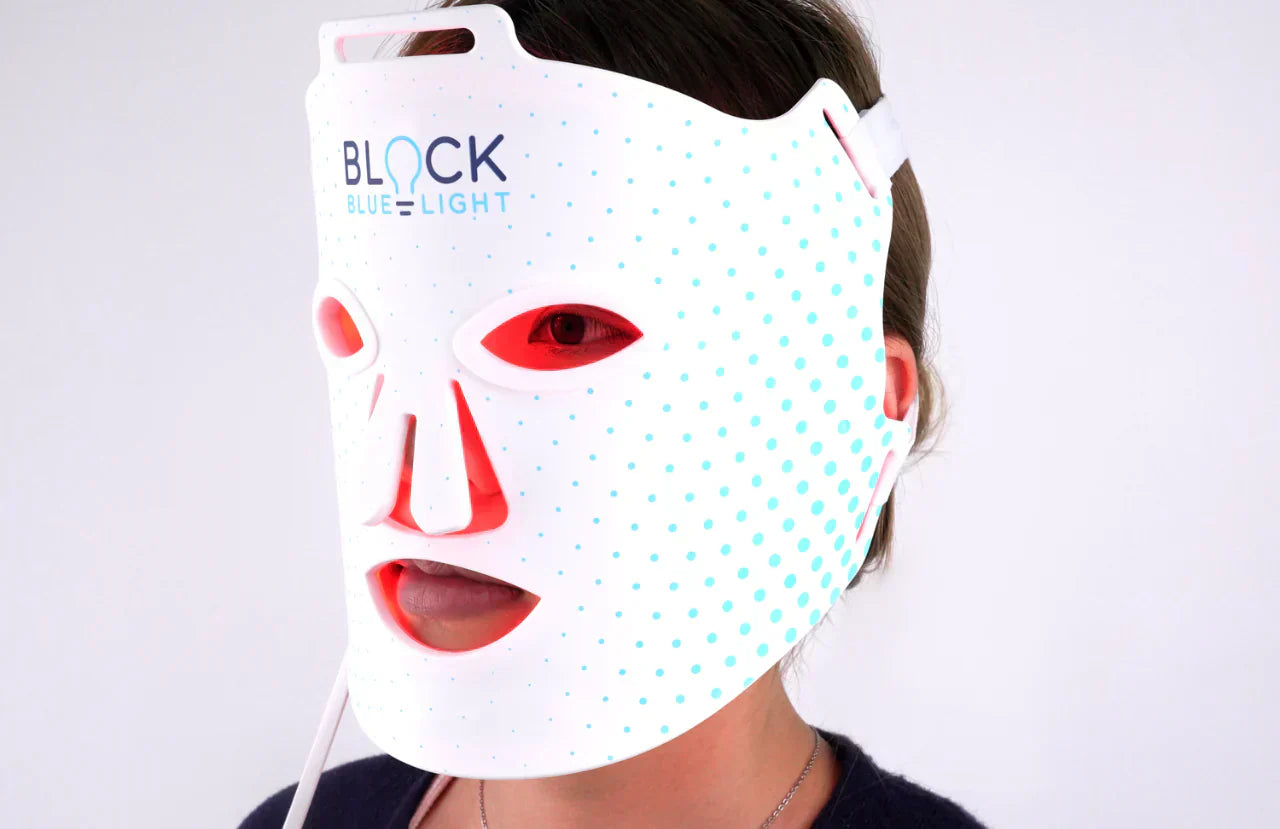Have you been having difficulty working on your computer due to dry eyes? If you’re wondering whether blue light has anything to do with this symptom, you’ve come to the right place. In this article, we will explain to you how blue light and dry eye are related, and what preventive measures you can take.
If you spend a prolonged amount of time using a computer or a digital screen, you have probably experienced dry eye among other undesirable symptoms. Health problems related to blue light exposure are growing more prevalent and impacting our well-being.
Dry eye is a result of digital eye strain caused directly by spending long hours using a computer or a digital device. Using a pair of blue light glasses can help you relieve dry eye and also prevent this symptom. Let’s have a closer look at what blue light is and the correlation between blue light and dry eye.
What is blue light?
Our biggest source of natural blue light is the sun. The white light we see from the sun is a combination of red, orange, yellow, green, blue, indigo, and violet light. Each of these colours has a different wavelength and energy. Rays emitted from the red end have longer wavelengths and less energy. While blue rays have shorter wavelengths and more energy. White light has a large blue component, which means that our eyes are exposed to a higher amount of wavelength from the blue end of the spectrum.

Blue light is not entirely harmful. The blue light we receive from the sun is required for our brains to differentiate between daytime and night time. Blue light sends a signal to our brain that we should be awake and alert. It is also linked to our circadian rhythm, our natural body clock. When we are not exposed to blue light during night time, our brain produces melatonin which makes us feel sleepy.
Digital screens like mobile phones, TV’s and computer screens, also emit blue light. So, the blue light emitted from LED’s disrupts our natural body clock due to a lack of melatonin production. Since blue light is high in energy and has a short wavelength, it also stresses and damages the eyes. The more time we spend staring at digital screens, the higher the exposure which increases the risk of developing dry eye.
As we are exposed to unnatural sources of blue light, even during night time, we might develop health problems like:
- Difficulty falling asleep
- Dry eye
- Headaches & migraines
- Low productivity
- Mood swings
- Eye strain
Whether you’re playing video games, watching television, staring at your computer screen, or scrolling on your smartphone, you are being exposed to blue light which causes blue light-related damage and dry eye. The fact that most people’s jobs involve staring at a computer screen for hours, relaxing by watching TV is not the best idea.
Apart from disrupting your sleep cycle, prolonged exposure to blue light can inhibit you from working properly due to dry eye. Over-exposure to blue light might also be associated with macular degeneration.
What is dry eye?
Dry eye is a common condition when your eyes are not able to provide adequate tears to keep your eyes hydrated. Tear production can be unstable or you might produce poor-quality tears. This instability in tear production can lead to inflammation and damage the eye.

Having dry eye is very uncomfortable and inhibits you from working properly as you find it difficult to focus on your screen. You might also experience an itching or burning sensation in your eyes.
You might also experience teary eyes as your eyes try to compensate for the dryness and poor-quality tears. This leads to further irritation and you might find yourself rubbing your eyes frequently to relieve the uncomfortable sensations. Dry eyes might be accompanied by other undesirable symptoms such as:
- Sensitivity to light
- Burning sensation
- Red eyes
- Feeling like you have something gritty in your eyes
- Difficulty focusing
- Blurry vision
- Eyes feeling tired and heavy
If you are experiencing any of these symptoms, they might be a result of too much harmful blue light exposure.
What is the connection between blue light and dry eye?
Research shows a correlation between short-wave blue light wavelengths between 415 and 455 nanometers and eye damage like dry eye. Most of the light emitted from smartphones, TVs, computer screens and tablets has wavelengths ranging between 400 and 490 nanometers.
Blue light is absorbed by the cornea and goes through the retina. Since blue light is high energy and has a short wavelength, it can impair your vision and could prematurely age your eyes. Early research shows that too much exposure to blue light could lead to retina damage, digital eye strain, and dry eyes.
- Retina damage: research suggests that prolonged exposure to blue light could lead to damaged cells in the retina. Such damage can cause vision problems such as macular degeneration.
Additionally, when people spend a long time working on a computer or digital screen, they tend to get hyper-focused. This means that they often stare intensely and forget to blink their eyes. Meaning that their eyes are constantly absorbing harmful blue light. As expected, this leads to digital eye strain and dry eyes.
-
Digital eye strain: Blue light from computer screens and digital devices can cause dry eyes, fatigue, irritability, and bad posture. When your eyes are dry and fatigued, you struggle to focus and you find yourself leaning your head close to the screen. This leads to further eye damage and can cause neck and back pain. Symptoms of digital eye strain include irritated eyes, a sense of itchiness, and difficulty focusing.
How can you prevent dry eyes?
Here are some tips on how to avoid constant exposure to blue light that can lead to dry eyes:
- Screen time: Take quick breaks to rest your eyes and decrease the amount of time spent in front of these screens.
- Screen Filters: You can find screen filters for smartphones, tablets, and computer screens to decrease the amount of blue light emitted from these devices.
- Blue Light Computer glasses: Computer glasses that block blue light come in different shades. Blue light glasses protect your eyes from harmful short-wavelength blue light.
How effective are blue light glasses against dry eyes?
A study published on April 5th 2016 by NCBI concluded that reducing short-wavelength blue light improves the performance of visual acuity in dry eye patients.
Wearing blue light glasses for dry eyes helps relieve the symptom as they block the harmful blue light from entering your eyes. To help prevent and relieve your dry eyes and other adverse effects, try out a pair of our wide selection of blue light blocking glasses. We also have blue light blocking glasses that block green light which is also associated with undesirable health effects.
Check out our selection of blue light glasses for dry eyes:
Screentime Computer Glasses (Clear Lens)
The ScreenTime Computer Glasses range are specifically created to allow the good light to be absorbed by your eyes. This light is important for alertness, good mood, brain activity, and optimal health. The ScreenTime Glasses however, filter the harmful blue light that causes dry eyes, digital eye strain, headaches and migraines, and macular degeneration.
Daymax Glasses (Yellow Lens)
Blue light blocking computer glasses with yellow-tinted lenses can help ease dry eyes by increasing contrast. Our DayMax glasses are next level when it comes to blue light protection. These computer glasses give maximum protection during the daytime. The DayMax Glasses can also be described as light sensitivity glasses, gaming glasses, or mood boosting glasses.
Sundown Glasses (Amber Lens)
The SunDown range is specifically designed and verified to block 100% of blue light. The amber lens Sundown Glasses should be used in the evening to increase melatonin production and improve your sleep quality. The best is to wear them 2-3 hours before bed to get the best results. This is to ensure that you are protecting your eyes from blue light which inhibits melatonin production.
Nightfall Glasses (Red Lens)
Our NightFall range is the most powerful and premium lens available. These glasses block blue light along with green light 100% up to 550nm. Green light is next to the blue light in the visible light colour spectrum. So green light can also disrupt melatonin secretion. To improve your sleep quality and ensure optimal wellbeing, these glasses provide the most optimal blue (and green) light protection. sleep or insomnia, or are looking to improve their sleep quality as much as possible. If you work night shifts, these glasses are also ideal for you to help you fall asleep easier.
If you already have glasses, you can also have a look at our selection of Fitover and clip-on blue light glasses for blue light protection to relieve and prevent dry eye.
References:
https://www.forbes.com/sites/bryanrobinson/2020/10/29/new-research-finds-blue-light-glasses-improve-workday-productivity/?sh=73f211f83956
https://www.discovermagazine.com/health/what-science-says-about-blue-light-blocking-glasses
https://www.ncbi.nlm.nih.gov/pmc/articles/PMC4821556/
https://www.mayoclinic.org/diseases-conditions/dry-eyes/symptoms-causes/syc-20371863
https://preventblindness.org/blue-light-and-your-eyes/
